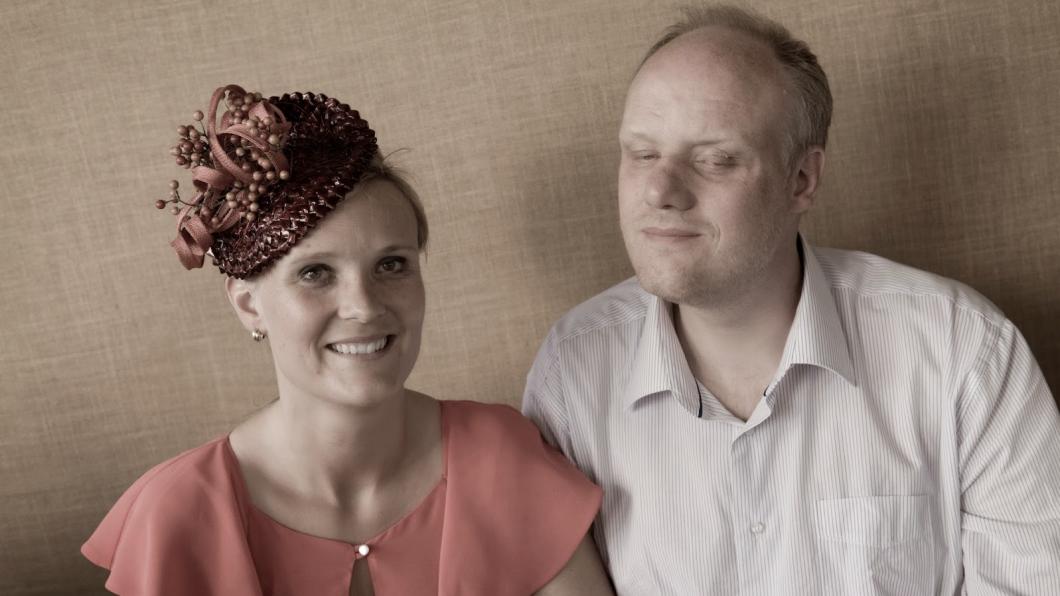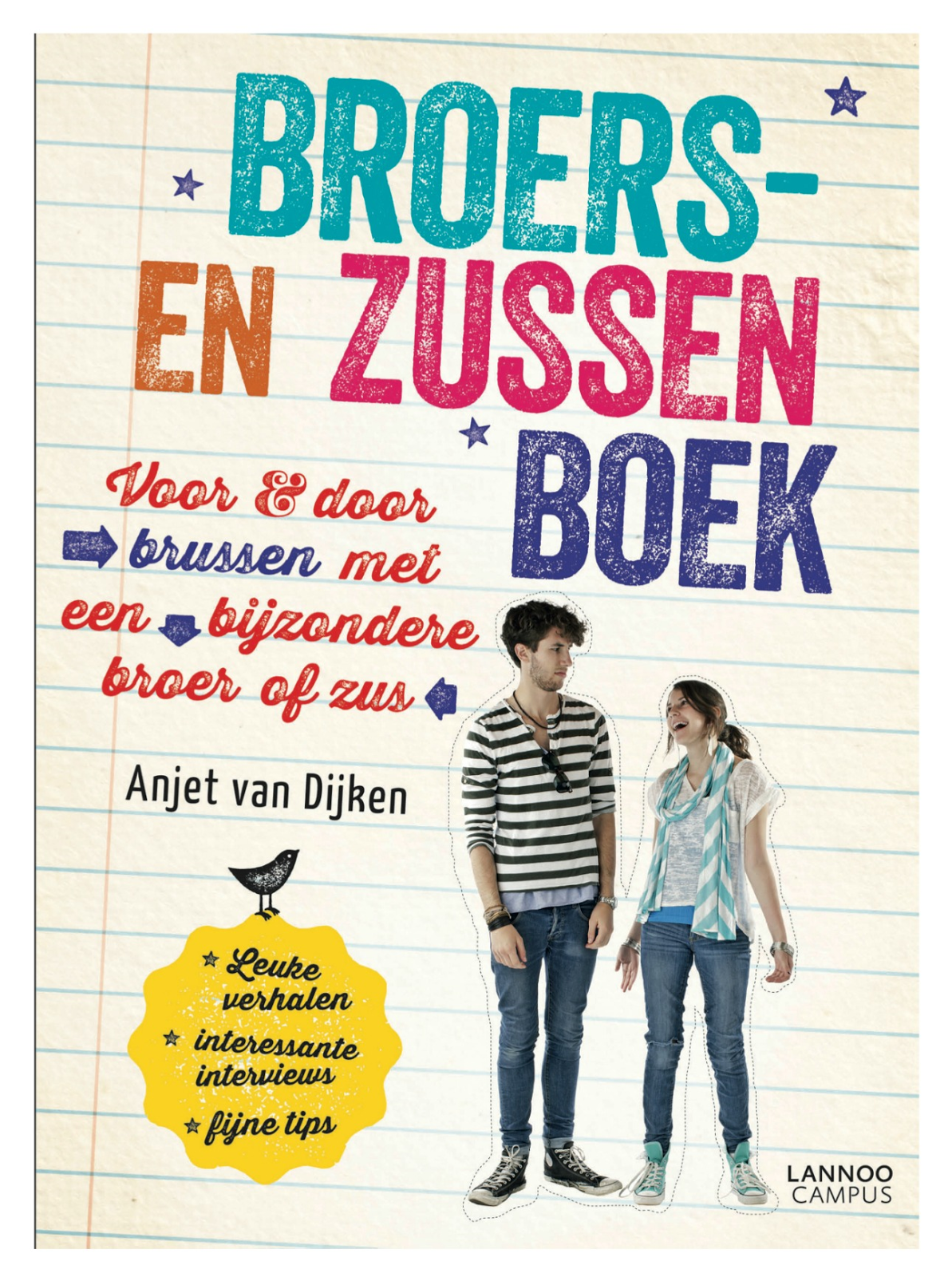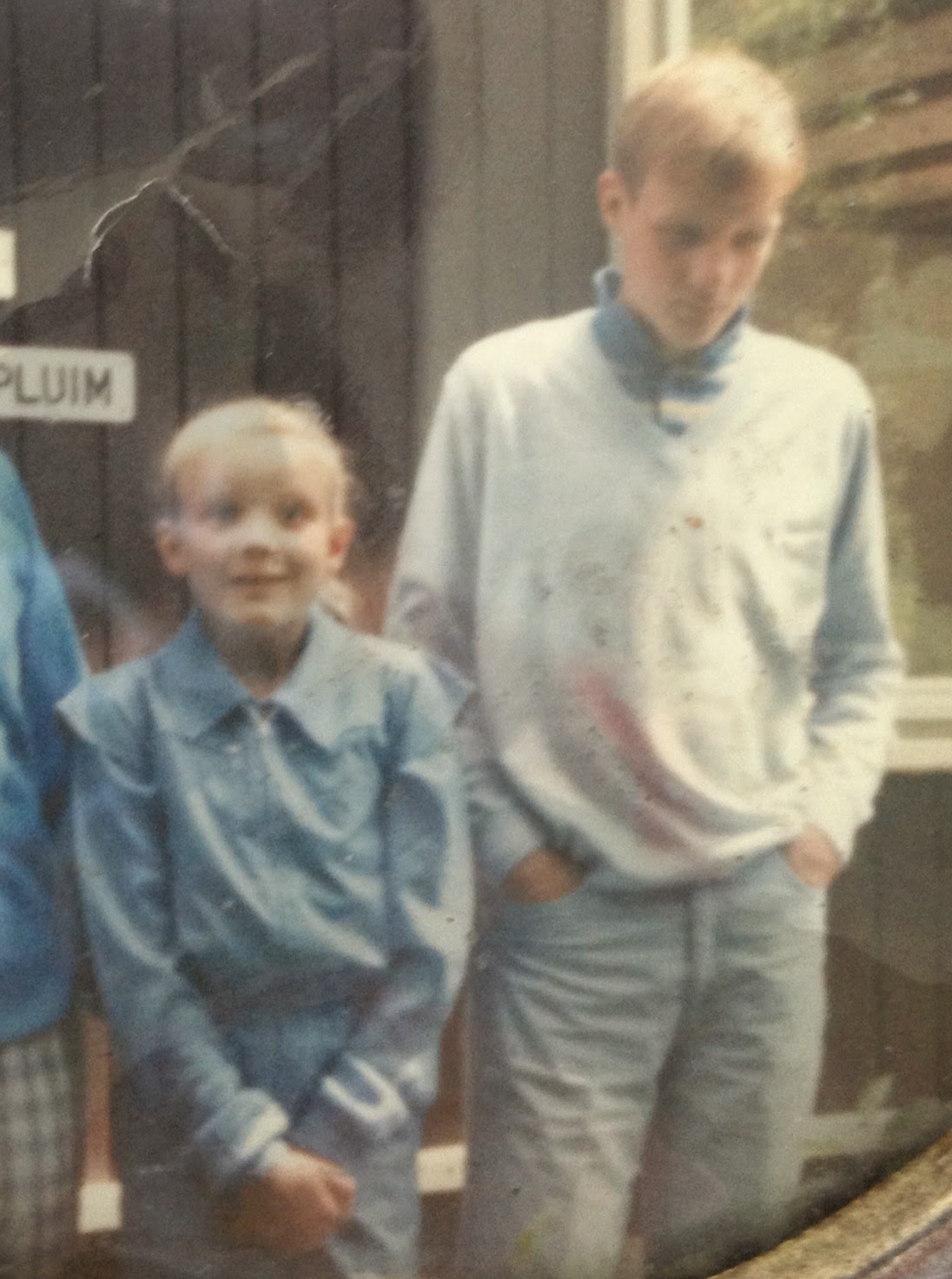
'No brother or sister should grow up thinking I'm the only one'
By Louise Kinross
Last year Dutch journalist Anjet van Dijken published the Brothers and Sisters Book, a first in Holland for siblings of children with disabilities, chronic health conditions and/or mental illness.
Anjet, 38 (above left), grew up with an older brother Jalbert (right), who was born with a visual disability and autism due to exposure to an infection during his mother’s pregnancy. In her book, Anjet interviews 36 siblings aged six to 69.
Her goal, she says, is to let all siblings know that they’re not alone, their thoughts and feelings matter, and that they must pursue their own dreams to be happy. Only then can their adult relationship with their brother or sister “come from the heart, rather than feel like a must-do obligation,” Anjet says.
Here she shares her own story growing up. Look to the September issue of BLOOM for Anjet’s tips to parents on siblings.
BLOOM: Tell us a bit about growing up with your brother.
Anjet van Dijken: When he was born he could only see a little bit and at age 11 he suddenly became blind. He had a mental disability that made him interested in just a few things: listening to marching band music and taking the train. He was perfect at knowing all of the bus and train timetables.
When I was three and Jalbert was six my parents decided to let him live in a home. My mother felt that he would get the best help there and that she had created a safe environment for him. She was worried about the future, about who would care for him when she wasn’t there. She didn't want to put the ‘burden’ on me.
To solve the problem that he lived 70 kms away, my parents purchased a summer vacation home near him. Every weekend we would drive from The Hague, where we lived, to our summer home in Utrecht. We’d pick him up, spend the weekend with him and then drop him off on Sunday afternoon.
I felt growing up that my brother was a lot in his own world and I tried to get him out of there. I felt his disability was too often used as a poor excuse for leaving him in his own world. For example, if people visited us, he could stay in his room and play his music for another three hours, while I was expected to come down, say hello, and sit for a while, even if I didn’t feel like it.
As a child I had all these thoughts about him and his development but I didn’t think my opinion mattered. The deepest reason for writing my book is to say to other siblings that their thoughts and opinions do matter and need to be expressed.
BLOOM: How did it feel when your brother moved away?
Anjet van Dijken: It felt normal. At age three I didn’t have any comparison. I didn’t feel a rupture because we went every weekend to my brother so I always felt I grew up with him, and that was a nice feeling. I loved his home. It was on a big terrain with lots of trees and until he was 11 he could see a little, so we could bicycle around that terrain together. He went to school but it wasn’t academic so I was jealous of him. He did fun and creative things like Snoezelen and colouring, while I had to learn things in my school.
BLOOM: Was it painful for Jalbert to go to the new home?
Anjet van Dijken: What has stayed in his mind is that he got to take a bus there and that the bus was great fun. It was exciting for him. He doesn’t complicate things. He doesn’t live in the ‘I wish I could’ world. He takes life as it is. I never felt that our weekends with him were not normal or that our goodbyes were painful for him.
BLOOM: What was it like for you to live in two places?
Anjet van Dijken: My life has been divided in a lot of respects. My upbringing in The Hague was like any other child’s. I had a mother waiting at home for me after school and activities like playing with friends, swimming and skating. Yet I felt like I was the only child, so I felt guilty about sort of ‘hiding’ my brother.
In Utrecht, life revolved a lot more around my brother. The plus side was that we were brother and sister. But Jalbert living away from us wasn’t ‘normal’ and I could never explain him to my friends: the fact that he lived in an ‘institution,’ as it was called then, always got in the way.
One thing that’s different for parents and siblings—especially for siblings who are younger than the child with disability—is that the disability and the brother go together. If people thought my brother was disabled I couldn’t understand that, because he was my brother. The disability belonged to him, [it] was part of the picture. I still can’t see the disability apart from him.
But it was impossible to tell my friends that Jalbert was ‘just like any brother.’ The best way I found to describe him was to say ‘I have a brother who's blind and disabled but always very happy!’ and I would emphasize the happy part. I wanted people to see him as he was.
Of course, he was not a brother that wanted to play with me, but what I admired in him was that he always saw the positive in people and situations. He will defend anybody and that was more important to me than the fact that he had disabilities. For me it was normal to walk across the street with him on my arm. Yet people would stare at us. Other people always saw the handicap. They never looked beyond the handicap. So that made me doubt myself a lot: maybe I was the one not seeing him for who he was?
For siblings, the hardest thing is that you have this brother that you love and others don’t see him for who he is. Growing older and looking back, I was angry at other parents with healthy children: they had a duty to educate themselves and their children.
Going to visit my brother on weekends became difficult for me from about the age of 12. That’s when I noticed that my friends were having games of hockey or tennis or doing other sports on the weekend in our hometown, and I couldn’t because I had to go along with my parents and brother.
BLOOM: What happened in your teen years?
Anjet van Dijken: As you get closer to puberty, friends start to matter more than brothers and sisters. That’s the case in every sibling relationship, as I show in research included in my book. But because Jalbert was not very involved or interested in my life during those years, I didn’t know what we meant to each other.
I began to think that my brother was of no use to me. And, in fact, he was a drawback: people always saw me as ‘the girl with a handicapped brother,’ not for who I was or wanted to be. At age 14 I sort of decided ‘he’s in a home, he’s not really in my life’ and it was like a rupture in my head.
Looking back, I was starting to form my own identity. I started to separate myself from the role I’d had with him, which was being either the carer or the class clown. I had loved the role of making my brother laugh to bring him out of his world. But at around 14 being the clown clashed with who I was.
At that time I'd started a hobby, working at a local radio station. For the first time in my life it didn’t have any link to my brother. I felt such an energy doing something I liked to do, just for me.
For a long time I felt guilty though, for being so selfish, for growing up and 'mentally' breaking up with my brother. But in retrospect I feel it was very healthy for me to say: ‘Now it’s my turn.’ My mother was understanding. She said ‘You don’t have to come with us every time we go to the summer home’ and she praised me for enjoying my life. More and more on weekends, I would stay with my father or we would go up later on a Sunday.
BLOOM: When you were young, both of your parents died.
Anjet van Dijken: When I was 16 my mother was hit by a car coming home from a school meeting about me. The next day she was declared brain dead.
Three years later, after my dad and I had grown closer, my dad died of an aneurysm. I was three months into university. The only light points were that one, my brother was there—I have one family member left and thank God it’s the one who is always the same— and two, he is taken care of in a home, so I don’t have to leave university.
The first thing I did with my brother after the funeral was to take him on a train trip.
BLOOM: How did he respond to your parents’ deaths?
Anjet van Dijken: For me, it was all about the emotions, but for Jalbert it was the factual that counted: ‘I counted on my mother, and she went,’ he said. ‘I counted on my father, and he left. Now I only have you. I can’t count on you anymore.’
For the first time I really hated his disability. I was the only family member left and he was going to throw me out too?
And not only could I not share my emotions with him, and memories of what we’d done together with our parents, but I felt an even bigger gap between us. Really, what was our bond? Was my role to be his carer, or was there room left to be his sister? At that point I felt empty. I felt I was expected to be his carer, and that felt wrong.
But that’s what I did for the first couple of years. I mindlessly helped him continue with his life as he had lived it when my parents were alive. I told myself I had to take him on a train trip every two weeks, but from day one I resented it. I don’t think it was fun for either of us.
Slowly, during my university years, I began to see that other brothers and sisters didn’t see each other every two weeks. I decided I should visit when I felt like it and I could sometimes have a day off. I started to say 'this is my life too, and I don’t always come second. '
BLOOM: Why did you decide to write your book?
Anjet van Dijken: The main reason is that I didn’t want other siblings to feel alone, as I had for so long. No brother or sister should grow up thinking I'm the only one with questions, with thoughts, with conflicting emotions.
You can be proud of your brother and at the same time ashamed, and then angry for being ashamed, and then sad because you were angry. My first idea was to write my own story. But then after working at the radio I felt strongly that if I interviewed 36 siblings, readers could ‘see’ that they weren’t the only one.
The other thing is I want to make siblings think about what they want in their own life. I want to show them by reading others’ stories that everyone is wondering about their place in the family and in the future, including their role in their sibling’s life.
Dr. Tinneke Moyson, the researcher who contributed to my book, found siblings tend to put themselves in the background. Out of loyalty, they feel they have to obey their parents and continue putting the [disabled] sibling in the centre of the family.
For siblings, trying to put yourself in the background AND living your life doesn’t work: it catches up with you. Though living your own life is not easy—especially if your parents have different expectations for you—I tell siblings they have to think about what they want first, and then how they’re going to be a part of their brother’s or sister’s life. Only then can you do it wholeheartedly.
BLOOM: You spoke to 36 siblings aged six to 69. What was the most common challenge they faced?
Anjet van Dijken: The first thing I noticed was that 33 out of 36 said they had never ever talked about this to another sibling. They had never met another sibling of a child with disability.
I loved writing the book because there’s no judgment between siblings when you have been through the same experience. Even though one person has a sibling with autism and one has a sibling with Down syndrome, they don’t look at what is different, but where are they the same? What can we relate to?
The common denominator is that you always defend your brother or sister first. If you interview a sibling they will tell you all the positive things first because it’s so important to them that others see their brother or sister as a person. You want them to be accepted. Then, if you feel understood, you will share what’s difficult. But initially there’s a holding back of your emotions.
BLOOM: Were there other common experiences?
Anjet van Dijken: I go to evenings where I speak to about 100 siblings and 80 per cent or more have never heard anyone speak the way I do about putting their life first and daring to talk about their emotions. Not only have they felt alone, but they thought they were crazy for a lot of the thoughts and feelings they have. ‘Now I understand I’m not crazy,’ they’ll tell me. ‘I’m a sib.’
BLOOM: How can siblings best be supported?
Anjet van Dijken: I'm involved in a research project with the Dutch Youth Institute where we hope the Dutch government will set a base of support and information for siblings, because there is none. One of the big problems is that siblings feel loyalty, out of love and respect, for their parents. So if they disagree with something—with the parents’ vision of how the future is going to be and where they fit in—they don’t dare speak out.
The sibling relationship is different than the parent relationship. As siblings, you’re not above or below, you are equal.
One sibling said to me: ‘I can’t tell my mother that my brother acts even more disabled when he is with her. With me, he can make his own toast, but with our mother, no, he just sits there and acts like a baby.’ The other child can see progress that the parent can’t.
Siblings aren’t initially aware that they need support. What they tell me is that they don’t want to go see someone like a psychiatrist. They want to know that there are other siblings and to get in contact with them. After one of our sibling group evenings they will say: ‘Wow, we all have the same thing.’
There are a few sibling groups for young children, but nothing for adults, and that’s my main focus.
Things get complicated when siblings are in their 20s and they have a relationship, or children, or a job. Many sibs spend every Saturday, or every other Saturday, caring for their brother or sister to give their parents relief. So young caretakers become adult caretakers.
But there's more: Our brothers and sisters are, due to advancements in health care, the first generation of people with disabilities who are outliving their parents. In America I read about the 'sandwich generation:' We are the ones raising our children, looking after our parents and taking care of our siblings. The how needs to be addressed, because we're not 'super' siblings.
Anjet can be reached on Twitter @DutchSib or at the Facebook group for her book. She has a Dutch Facebook group for siblings at Lotje@coBrussen. Her book is available in Dutch but she would love to hear from families and professionals who'd like it translated into English. Watch this captioned video of her book launch. The Brothers and Sisters Book is published by LanooCampus: EAN 9789401408844. This is the book cover and a photo of Anjet and Jalbert as children.

